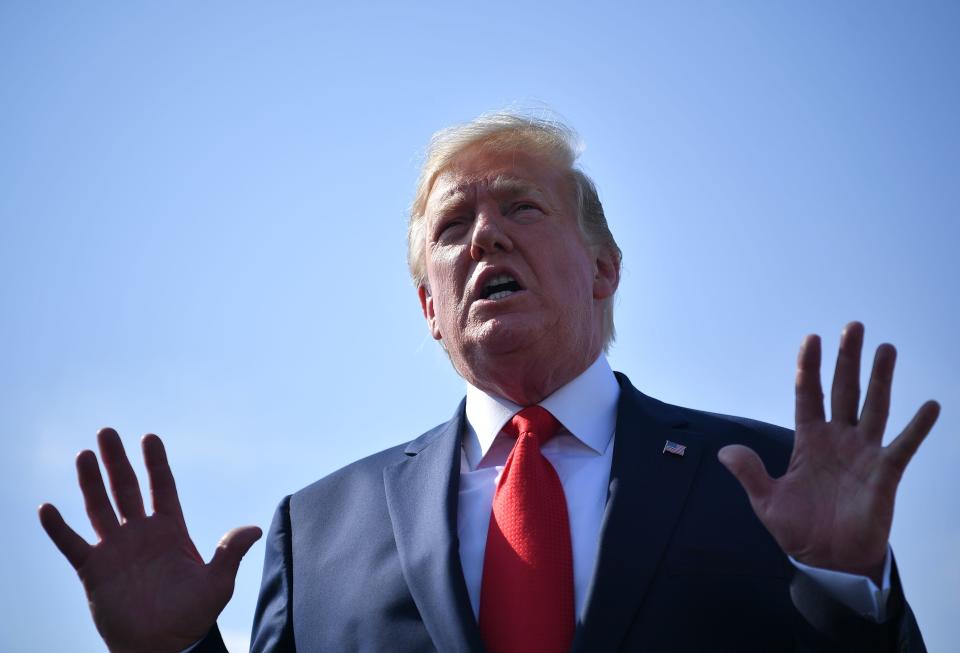Trump doesn't understand how social media works

President Donald Trump will convene a social media summit at the White House on Thursday purportedly to discuss issues pertaining to social media sites like Google's (GOOG, GOOGL) YouTube, Facebook (FB), and Twitter (TWTR).
Trump's main beef with social media companies is that they supposedly target conservative commentators and politicians by taking down certain posts, blocking their accounts, or "shadow banning" them.
But there's no evidence of such practices. Because despite how much time Trump spends on Twitter, he simply doesn't get how it works.
A ‘robust conversation’ about social media
According to a White House spokesperson, the July 11 social media summit will "bring together digital leaders for a robust conversation on the opportunities and challenges of today’s online environment."
But as CNN Business points out, representatives from Facebook and Twitter, two of the largest social media companies on Earth, haven't been invited to the event. Facebook confirmed to Yahoo Finance that it hasn't been invited to participate or attend, while Twitter declined to comment. (In April, Twitter CEO Jack Dorsey met with Trump during a closed-door meeting.)
Conservative commentators, however, have been asked to show up, according to The Washington Post. A social media summit without some of the most important names in social media doesn't sound very constructive. Instead, it looks more like an opportunity for commentators to cry foul about supposed conservative bias on social platforms.
No conservative bias
In an interview with Fox’s Tucker Carlson last week, Trump accused Twitter of purposely making it more difficult for users to find him on the social network. In the same breath, though, the president bragged that he has "millions and millions" of followers. Indeed, at last count, Trump has more than 61.7 million Twitter followers. That doesn't sound like someone who's hard to find.
Trump's refrain is a common one in conservative circles and points to a perceived bias that social media favors liberal groups and politicians. Varying right-leaning personalities have complained more since Trump’s election that social networks censor conservative voices.
The reality is that social media sites only take down posts and block accounts when they violate established content rules, and even then they are often criticized for not doing so quickly enough. Critics also point to a recent drop in the number of social media followers, though that's also easily explained as companies cut down on bots, or phony accounts.
Twitter has removed many people from my account and, more importantly, they have seemingly done something that makes it much harder to join - they have stifled growth to a point where it is obvious to all. A few weeks ago it was a Rocket Ship, now it is a Blimp! Total Bias?
— Donald J. Trump (@realDonaldTrump) October 26, 2018
Heck, chances are if you're a frequent Twitter user, you've got plenty of bots following your account right now. And if Twitter killed them, the number of followers you have would, naturally, drop.
Trump has also frequently targeted Google for supposedly only showing negative stories about him. But Google doesn't adjust its search algorithm to smear individuals. Rather, the search giant attempts to provide users with the closest match for the information they’re seeking. There isn't a separate algorithm within Google specifically designed to undermine the president.
But Trump has gone so far as to accuse tech companies of committing unspecified illegal activities, and claims that authorities are looking into them.
"What they are doing is wrong, and possibly illegal, and a lot of things are being looked at right now," Trump told Carlson in the interview. The president, however, wouldn't give specifics on what exactly could be illegal.
Even if social media companies did have a liberal-leaning bias, there's nothing Trump could do about it. That's because the First Amendment, which protects free speech, also covers social media networks.
Social media companies want everyone's money
Trump’s claims that social media sites are biased against conservatives may drum up headlines, but the truth is far simpler. These are companies, and they want to reach as many potential consumers as possible.
Cutting out conservative voices would alienate conservative users, which could dent a social media network's bottom line. For proof that companies want to avoid conversations about political bias, look no further than their own official political contributions.
In 2016, Facebook, Twitter, and Google all donated to both the Democratic and Republican national conventions. Twitter, Inc., which Trump has repeatedly called out as biased, donated an even $250,000 to both the Democrats and Republicans.
What's more, Facebook embedded teams in both the Trump and Clinton campaigns during the 2016 presidential election to help them better reach potential voters through political ads.
In reality, there has been no evidence of conservative bias beyond anecdotes from a few key commentators and lawmakers.
And that’s not likely to change after Thursday’s summit.
More from Dan:
Zuckerberg defends Facebook's decision to keep up Pelosi ‘deepfake’ video
Lenovo’s and Google's Smart Alarm Clock might make you hate mornings less
Email Daniel Howley at dhowley@yahoofinance.com; follow him on Twitter at @DanielHowley.
Follow Yahoo Finance on Twitter, Facebook, Instagram, Flipboard, SmartNews, LinkedIn,YouTube, and reddit.
